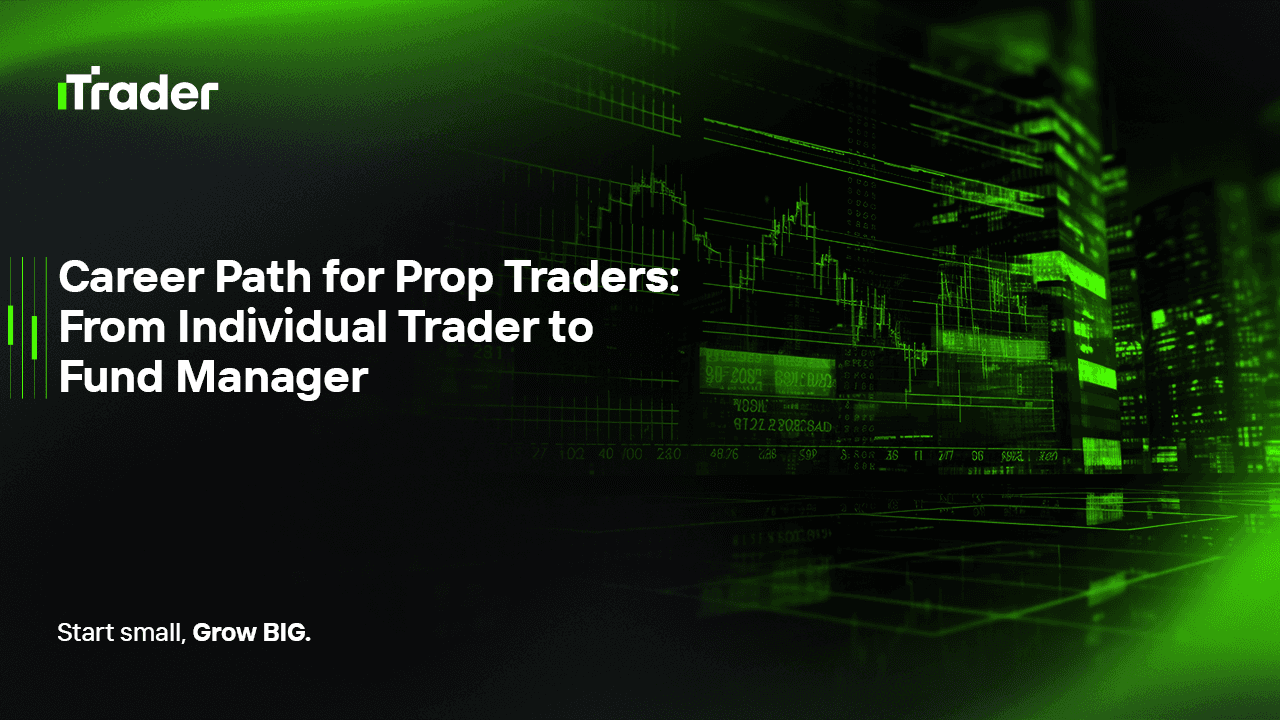2025-09-19
In the world of forex and financial markets, becoming a prop trader is a dream for many. Passing a prop firm’s evaluation and gaining access to capital without risking personal funds is a huge milestone. Yet, this is not the endpoint. On the contrary—it marks the beginning of a much broader career trajectory, where an independent trader can evolve into a portfolio manager and, ultimately, an asset manager.

This blog explores the career path of prop traders across five major stages, highlighting the goals, skills, and challenges at each level, as well as the future trends shaping this journey.
At this stage, discipline is everything. While strategy, indicators, and technical knowledge matter, they are never enough on their own. The real test lies in the psychological ability to accept losses.
Most traders fail prop evaluations due to over-leverage or impatience. This stage is essentially survival school—learning how to last long enough to build consistency.
Once an independent trader shows stable profitability, they often gain access to larger allocations within the prop firm. At this stage, the goal shifts from mere survival to institutional-grade performance.
Many traders at this stage sabotage themselves by trying to expand too quickly—juggling too many strategies at once and destabilizing their equity curve.
As advanced traders mature, they often begin collaborating with peers. At this stage, traders focus not only on their personal performance but also on contributing to a team or “strategy desk.”
Trust, transparency, and communication become central. A trader must respect not only their own discipline but also the team’s collective approach.
This stage represents a major career transition. Moving beyond prop firm capital, traders can attract external investors if they prove consistent performance.
The biggest obstacle is bridging the gap between personal trading style and institutional standards. For investors, profitability matters—but long-term stability and risk control matter even more.
The final stage is reaching the level of an asset manager. At this point, the trader is no longer just an operator but becomes a business owner managing capital at scale.
At this level, success requires a balance of technical expertise, business acumen, and interpersonal skills—a demanding combination that separates professionals from amateurs.
The career of a prop trader does not end with passing a firm’s evaluation. It is the beginning of a multi-stage progression:
At every stage, the keys remain the same: discipline, transparency, and reputation. With these, any trader can evolve from trading a small account to managing millions in investor capital.
© 2025 iTrader Global Limited|会社登録番号:15962
iTrader Global Limitedは、コモロ連合のアンジュアン自治島ムツァムドゥのHamchakoに所在し、コモロ証券委員会によって認可・規制を受けています。ライセンス番号は L15962/ITGL です。
iTrader Global Limitedは「iTrader」の商号で運営しており、外国為替取引業務を行う許可を受けています。会社のロゴ、商標、ウェブサイトはすべて iTrader Global Limited の専有財産です。
iTrader Global Limitedの他の子会社には、iTrader Global Pty Ltd(オーストラリア会社登録番号(ACN):686 857 198)が含まれます。 この会社は、Opheleo Holdings Pty Ltd(オーストラリア金融サービスライセンス(AFSL)番号:000224485)の認可を受けた代表者(AFS代表番号:001315037)です。登録住所は Level 1, 256 Rundle St, Adelaide, SA 5000 です。
免責事項: この法人は、本ウェブサイト上で取引される金融商品の発行者ではなく、それらに対して責任を負いません。
リスク警告: 差金決済取引(CFD)は、レバレッジにより資本の急速な損失リスクが高く、すべての利用者に適しているとは限りません。
ファンド、CFD、その他の高レバレッジ商品を取引するには、専門的な知識が必要です。
調査によると、84.01%のレバレッジ取引者が損失を被っています。取引を開始する前に、リスクを十分に理解し、資金を失う可能性があることを認識してください。
iTraderは、レバレッジ取引によるリスク、損失、またはその他の損害について、個人または法人に対して一切の責任を負わないことを明言します。
利用制限: iTraderは、法律、規制、または政策によりこのような活動が禁止されている国の居住者を対象として、本ウェブサイトやサービスを提供していません。